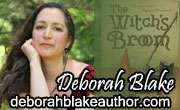Kat and I are reading Puck of Pook's Hill by Rudyard Kipling right now. It's a classic Fantasy story, but what I find interesting is that in the first chapter, if you know what to look for, you discover a lot of esoteric and occult practices shared with the protagonists of the story, and this sharing continues throughout the rest of the book. It's a subtle way to teach magic to readers. Given when the book was written, the author needed to be subtle about it, but what fascinates me is that even to this day you can still find a number of fantasy writings where esoteric ideas and secrets are shared if you know what to look for. And if you don't know what to look for, well guess what? You're being given an education in magic and how it works so that if you get to that point where you actually start practicing you've already got some idea of how magic seems to work.
Kat and I like to discuss the books we are reading together, so we got into a long and fascinating conversation about not only Rudyard Kipling, but some of those writers who've written esoteric secrets into their fantasy. For example, if you've read any of Michael Moorcock's writings you'll find quite a lot of esoteric secrets shared. In Elric of Melnibone, he practically spells how to evoke an entity in several different instances where the character needs supernatural aide. In the Corum series, he focuses in on the magical aspects of gift giving and the connections gods have to people and vice versa. And there's a number of other series he writes in where he shares esoteric ideas and concepts, which I recognize many years later as playing a foundational role in my understanding of magic. As a young, impressionable reader the stories I read fascinated me because of the adventure, but as a magician I can see how my evocation practice has been shaped by what Moorcock wrote, as well as some of other esoteric beliefs and practices.
...







 This is my first post in this blog and it is actually the first time I am blogging. Although I am generally an early adopter of many technologies and cultural trends, I do resist certain things. As an example, I did not have a cell phone until 3 years ago though I have had email since 1979. Part of my resistance to blogging was that I needed to choose a focus for the blog because I am blessed with so many interests. I am passionate about the growth and development of the various intertwining streams of inspiration that form the pagan community. I also feel a great sense of duty to this community, this marvel of diversity that so often overflows its banks and cuts new stream beds. The name of my blog is "Skryclad" a play on skry and skyclad as I intend to offer my bare personal truths clothed in my visions, dreams, and observations. It is my intention for passion and duty to equally inform my work on this blog.
This is my first post in this blog and it is actually the first time I am blogging. Although I am generally an early adopter of many technologies and cultural trends, I do resist certain things. As an example, I did not have a cell phone until 3 years ago though I have had email since 1979. Part of my resistance to blogging was that I needed to choose a focus for the blog because I am blessed with so many interests. I am passionate about the growth and development of the various intertwining streams of inspiration that form the pagan community. I also feel a great sense of duty to this community, this marvel of diversity that so often overflows its banks and cuts new stream beds. The name of my blog is "Skryclad" a play on skry and skyclad as I intend to offer my bare personal truths clothed in my visions, dreams, and observations. It is my intention for passion and duty to equally inform my work on this blog.










